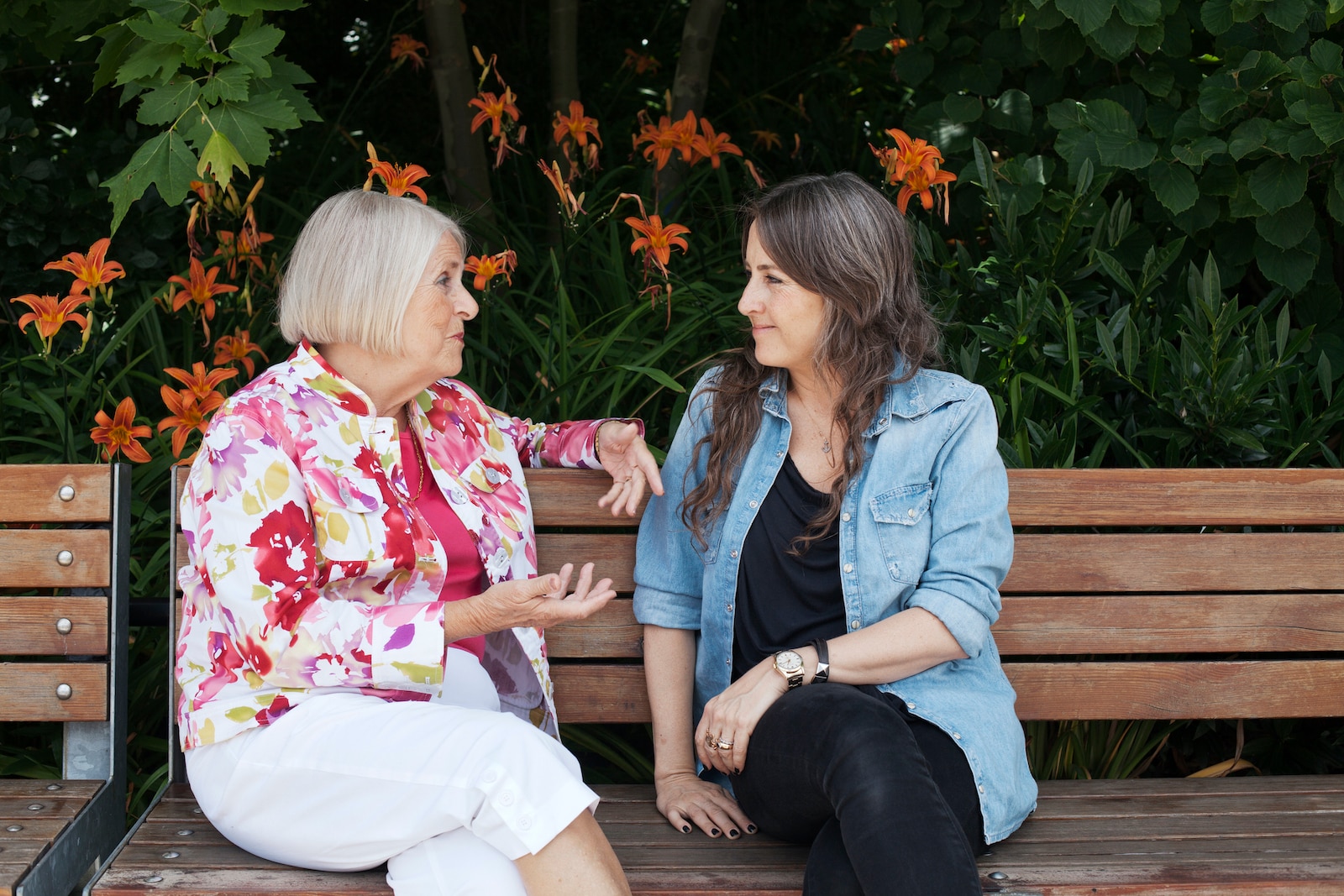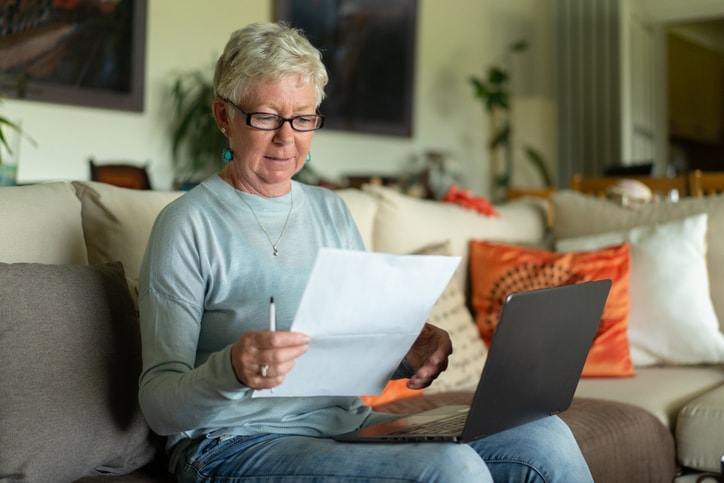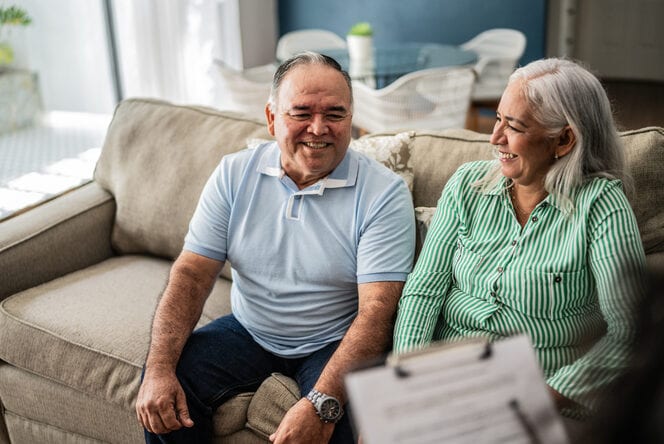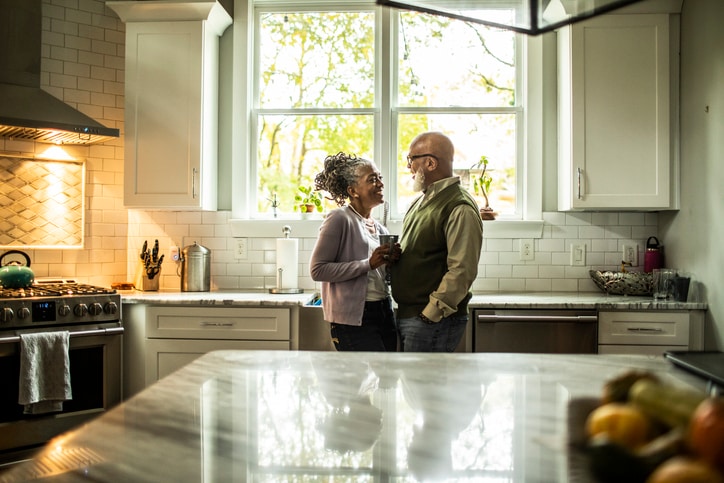In this article
No matter what type of relationship you have with your parents or a beloved senior, there are some conversations that are easier to have than others. If you’re unsure or anxious about how to talk to aging parents about their future care plan, you’re not alone. According to data from the Care.com 2021 Senior Care Outlook Survey, 53% of adult children anticipate that talking through senior care options with their loved ones will be difficult in contrast to 33% of seniors who responded also feeling that way.
But Wendy Taylor, a senior care expert at CareBuilders at Home, says that by having smaller talks earlier on, you might be able to alleviate anxiety around a bigger, hairier, more all-encompassing conversation.
Here, what Taylor and other experts say you need to know about the best time to discuss a care plan, how to prepare and what to do to ensure it’s the most productive it can be.
The best time to talk to aging parents about their future care plan
Typically, there are two ways to go about discussing your parents’ care plans and preferences:
1. When it becomes time-sensitive after a life-changing or unplanned event. A medical procedure may prompt a parent or loved one to realize that they are vulnerable and may need to think about the future, explains Ann Kriebel-Gasparro, a family and gerontological nurse practitioner and faculty member for Walden University’s Master of Science in Nursing program. It could also be after a medical emergency such as a fall, when cognitive impairment becomes apparent or after the death of a spouse.
2. Preemptively, before any physical or mental health declines occur. At this point, your loved one has plenty of time to make an informed decision and the cognitive ability to express his or her preferences in regards to where they’d prefer to live and the type of care they’d like to receive.
Though you might have no choice but to go with the first option, it’s simply better for everyone involved if you have the talk sooner than later. Ideally, you want to do it when your parents are healthy and their minds are clear so you know they are giving reliable answers, says Iris Waichler, a licensed clinical social worker and author of Role Reversal: How to Take Care of Yourself and Your Aging Parents.
If you wait until a healthcare crisis occurs to first start thinking about plans, you’ll have to guess what their wishes are — all in the middle of a crisis. “That uncertainty is a huge burden for adult children,” she says. “Having this discussion early can be the greatest gift a parent gives an adult child.”
“It’s a process, and if you are shut down the first time, don’t be discouraged.”
— Iris Waichler, licensed clinical social worker and author
Other benefits of preemptively talking to seniors about their care plan
- It allows seniors the chance to be involved and have their wishes heard.
- It removes the burden from adult children who might have no idea what their parents really want.
- It can also prevent “family feuds” when adult siblings can’t agree on what they believe mom or dad really wanted, adds Marguerite Rossi, a retired geriatric nurse practitioner who now cares for her father-in-law.
What to keep in mind before talking to aging parents about future care
For starters, it’s crucial to remember that this won’t be a one-time discussion. “It’s a process, and if you are shut down the first time, don’t be discouraged,” says Waichler. “It may take multiple attempts.”
Before diving in, here are some other things to keep in mind:
Think about the outcome you’re hoping for. Do you simply want to explore potential options for securing some supportive service that would allow them to age in place, or do you need to immediately choose a facility so that an elder parent with medical issues can be discharged from the hospital?
“Be clear in your own mind about the ‘agenda,’ but make every effort to stay open-minded, realistic, empathetic when broaching such emotion-laden topics,” says Rossi.
Arm yourself with information. Kriebel-Gasparro recommends reviewing available resources first so you’re aware of different options but says to “use only trusted sources that are free and do not require a fee, such as through AARP.”
Seek support from experienced professions. Kriebel-Gasparro suggests turning to geriatricians, geriatric nurses, nurse practitioners, palliative care or hospice nurses or nurse practitioners as they all have specialized training in end-of-life care and “can be an invaluable” part of the talk.
Select the right person for the job. Whether it’s you or another loved one, pick a person you know they trust and will likely feel the most comfortable having this conversation with.
”Remember they may not see what you see in terms of health issues or problems with their functioning,” says Waichler, so think about who they may be most receptive to.
Read more:
How to talk to aging parents about their future in a productive way
Try these moves to boost the chances that the talk goes smoothly.
Use a movie as a catalyst. A recent study showed some movies can realistically demonstrate the decisions that need to be made at the end of life, so consider screening one to broach or further the care conversation.
Ask questions. Kriebel-Gasparro suggests these icebreakers:
- Have you ever thought about what a good death is? And what would that mean for you?
- Do you want to be at home?
- Should your health decline, at what point would you want to be in the hospital?
Then, as the chat starts flowing, Waichler recommends sprinkling in these questions:
- Would you want to stay home regardless of your care needs?
- Who would you want to take care of you if you needed help?
- Would you be OK with a healthcare professional assisting you if it is something I don’t know how to do?
- Would you ever consider moving to assisted living where 24-hour help is available in an emergency?
Explore “what if” scenarios. Taylor says this strategy can make care and end-of-life planning feel more constructive.
An example of this is if there was a report in the local news regarding a car crash, she explains. “The adult child can bring up the incident with the parent and ask them what they would do in that situation and how they would want to be cared for,” she says. “As long as they are part of the decision making process on their future care plans, they will feel like they are in control.” That fact alone will help make for a more positive experience.
Come from a place of compassion — not fear. Don’t make this about you or concerns for your future or a potential burden. Instead, emphasize that you want to do all you can to have them live as long as possible with as much quality of life and safety as possible, and you want to work on it together, says Waichler.
Be clear when asking about their wants. “Without being too morbid, you can realistically discuss the difference between ‘a good death’ and ‘a bad death,’” she says. “Pain management is key to a good death, as well as avoiding unwanted and unnecessary procedures such as intubation or feeding tubes that prolong life when death is imminent.”
Separate yourself from your parents. “Try not to impose your own desires on your parents, or what you expect to do for yourself in your later years,” says Rossi. “If they are still of sound mind and body and capable of participating in the planning, hear what they have to say.”
Do not force the conversation. Although this is an important conversation, remember that you can’t push them into it. “It should be voluntary and agreeable to all participants,” she adds. And again, if it’s not working out in any given moment, it could be worth a shot to try again later on.
Talk to aging parents about future care sooner rather than later
The fact is that most people in their 50s or even 60s are still reluctant to consider themselves mortal, says Kriebel-Gasparro, but this is the best time to think about life planning.
She adds that with thousands of Baby Boomers hitting their senior years — causing what’s being referred to as the “silver tsunami” — every day, we all have an increased awareness of death and the need for advance care planning. And it’s the next generation who will be on front lines of making end-of-life care decisions with — and sometimes on behalf of — their Boomer loved ones, whether they’ve discussed the particulars with them — or not.





